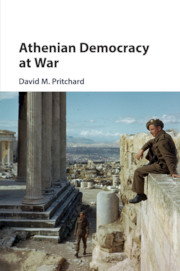Book contents
- Athenian Democracy at War
- Athenian Democracy at War
- Copyright page
- Contents
- Figures
- Tables
- Foreword
- Preface
- Abbreviations
- Chapter 1 Athenian Democracy at War
- Chapter 2 The Armed Forces
- Chapter 3 Naval Matters in Old Comedy
- Chapter 4 Costing Festivals and Wars
- Chapter 5 The Cost of the Peloponnesian War
- Chapter 6 Public Finance and War in Ancient Greece
- Chapter 7 Sport and War
- Chapter 8 War and Panhellenic Sporting Victory
- Glossary of Greek Terms
- References
- General Index
- Index of Sources
- References
References
Published online by Cambridge University Press: 08 November 2018
- Athenian Democracy at War
- Athenian Democracy at War
- Copyright page
- Contents
- Figures
- Tables
- Foreword
- Preface
- Abbreviations
- Chapter 1 Athenian Democracy at War
- Chapter 2 The Armed Forces
- Chapter 3 Naval Matters in Old Comedy
- Chapter 4 Costing Festivals and Wars
- Chapter 5 The Cost of the Peloponnesian War
- Chapter 6 Public Finance and War in Ancient Greece
- Chapter 7 Sport and War
- Chapter 8 War and Panhellenic Sporting Victory
- Glossary of Greek Terms
- References
- General Index
- Index of Sources
- References
- Type
- Chapter
- Information
- Athenian Democracy at War , pp. 229 - 256Publisher: Cambridge University PressPrint publication year: 2018



